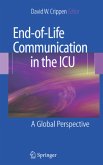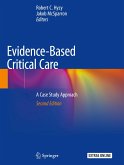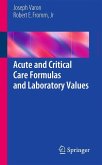Evidence-Based Critical Care
A Case Study Approach
Herausgegeben:Hyzy, Robert C
Evidence-Based Critical Care
A Case Study Approach
Herausgegeben:Hyzy, Robert C
- Broschiertes Buch
- Merkliste
- Auf die Merkliste
- Bewerten Bewerten
- Teilen
- Produkt teilen
- Produkterinnerung
- Produkterinnerung
This book provides learners with a unique opportunity by virtue of the format outlined above. Each case presentation has a case vignette, which leads up to an important clinical question, and is followed by additional discussion which resolves the question posed. This is a new way to present knowledge in a medical book and should help critical care practitioners, fellows, residents, allied health professionals and students expand their critical care knowledge in an efficient and effective manner. This approach should also benefit those preparing for board examinations.
Andere Kunden interessierten sich auch für
![Anaesthesia, Pain, Intensive Care and Emergency Medicine - A.P.I.C.E. Anaesthesia, Pain, Intensive Care and Emergency Medicine - A.P.I.C.E.]() A. Gullo (ed.)Anaesthesia, Pain, Intensive Care and Emergency Medicine - A.P.I.C.E.116,99 €
A. Gullo (ed.)Anaesthesia, Pain, Intensive Care and Emergency Medicine - A.P.I.C.E.116,99 €![Anaesthesia, Pain, Intensive Care and Emergency Medicine ¿ A.P.I.C.E. Anaesthesia, Pain, Intensive Care and Emergency Medicine ¿ A.P.I.C.E.]() Antonio Gullo (ed.)Anaesthesia, Pain, Intensive Care and Emergency Medicine ¿ A.P.I.C.E.53,49 €
Antonio Gullo (ed.)Anaesthesia, Pain, Intensive Care and Emergency Medicine ¿ A.P.I.C.E.53,49 €![End-of-Life Communication in the ICU End-of-Life Communication in the ICU]() End-of-Life Communication in the ICU79,99 €
End-of-Life Communication in the ICU79,99 €![Evidence-Based Critical Care Evidence-Based Critical Care]() Evidence-Based Critical Care106,99 €
Evidence-Based Critical Care106,99 €![Evidence-Based Critical Care Evidence-Based Critical Care]() Evidence-Based Critical Care218,99 €
Evidence-Based Critical Care218,99 €![Acute and Critical Care Formulas and Laboratory Values Acute and Critical Care Formulas and Laboratory Values]() Joseph VaronAcute and Critical Care Formulas and Laboratory Values64,99 €
Joseph VaronAcute and Critical Care Formulas and Laboratory Values64,99 €![Problems of the Gastrointestinal Tract in Anesthesia, the Perioperative Period, and Intensive Care Problems of the Gastrointestinal Tract in Anesthesia, the Perioperative Period, and Intensive Care]() Problems of the Gastrointestinal Tract in Anesthesia, the Perioperative Period, and Intensive Care112,99 €
Problems of the Gastrointestinal Tract in Anesthesia, the Perioperative Period, and Intensive Care112,99 €-
-
-
This book provides learners with a unique opportunity by virtue of the format outlined above. Each case presentation has a case vignette, which leads up to an important clinical question, and is followed by additional discussion which resolves the question posed. This is a new way to present knowledge in a medical book and should help critical care practitioners, fellows, residents, allied health professionals and students expand their critical care knowledge in an efficient and effective manner. This approach should also benefit those preparing for board examinations.
Produktdetails
- Produktdetails
- Verlag: Springer / Springer International Publishing / Springer, Berlin
- Artikelnr. des Verlages: 978-3-319-82796-4
- Softcover reprint of the original 1st ed. 2017
- Seitenzahl: 832
- Erscheinungstermin: 7. August 2018
- Englisch
- Abmessung: 254mm x 178mm x 42mm
- Gewicht: 1721g
- ISBN-13: 9783319827964
- ISBN-10: 3319827960
- Artikelnr.: 55129954
- Herstellerkennzeichnung
- Springer Nature c/o IBS
- Benzstrasse 21
- 48619 Heek
- Tanja.Keller@springer.com
- Verlag: Springer / Springer International Publishing / Springer, Berlin
- Artikelnr. des Verlages: 978-3-319-82796-4
- Softcover reprint of the original 1st ed. 2017
- Seitenzahl: 832
- Erscheinungstermin: 7. August 2018
- Englisch
- Abmessung: 254mm x 178mm x 42mm
- Gewicht: 1721g
- ISBN-13: 9783319827964
- ISBN-10: 3319827960
- Artikelnr.: 55129954
- Herstellerkennzeichnung
- Springer Nature c/o IBS
- Benzstrasse 21
- 48619 Heek
- Tanja.Keller@springer.com
Dr. Robert C. Hyzy is a Professor of Medicine in the Division of Pulmonary and Critical Care Medicine at the University of Michigan in Ann Arbor. Dr. Hyzy is a graduate of Kenyon College and received his medical degree from New York University School of Medicine in New York City. Dr. Hyzy completed his residency in Internal Medicine and fellowship in Pulmonary and Critical Care Medicine at the University of Michigan. He is Director of the Critical Care Medicine Unit at the University of Michigan Hospital and Co-Chair of the University of Michigan Hospital Critical Care Committee. Dr. Hyzy¿s research interests are in the area of critical care medicine, including ARDS, ventilator associated pneumonia, and quality improvement. He was the principal investigator of an NIH funded trial examining the efficacy of GM-CSF in patients with Acute Lung Injury. He is currently the site Principal Investigator of NIH sponsored trials in the treatment of ARDS and in the treatment of delirium in the intensive care unit. He is a member of the American College of Chest Physicians Guidelines Oversight Committee and Chairs the American Thoracic Society Quality Improvement Committee. Dr. Hyzy has spoken nationally and internationally on several topics related to Critical Care Medicine. He has published multiple articles and chapters in medical journals and textbooks and has served as a reviewer for several major medical journals including Critical Care Medicine, Chest, Annals of Internal Medicine and the American Journal of Respiratory and Critical Care Medicine. His editorial work includes a volume of the Clinics in Critical Care Medicine, entitled, ¿Enhancing the Quality of Care in the ICU, ¿ published in 2013. In addition, Dr. Hyzy contributes thirteen topics on mechanical ventilation to the web based medical resource UpToDate.
Cardiac Arrest Management.- Post- Cardiac Arrest Management.- Undifferentiated Shock.- Hypovolemic Shock and Massive Transfusion.- Acute Respiratory Failure - NIV Implementation and Intubation.- Diagnosis and Management of Tricyclic Antidepressant Ingestion.- Management of Calcium Channel Blocker Poisoning.- Diagnosis and Management of Ethylene Glycol Ingestion.- Accidental Hypothermia.- Management of Cardiogenic Shock.- Management of Acute Heart Failure.- Management of Acute Coronary Syndrome.- Complications of Myocardial Infarction.- Management of Cardiac Tamponade.- Hypertensive Crises.- Atrial Fibrillation and Other Supraventricular Tachycardias.- Ventricular Arrhythmias.- Management of Acute Aortic Syndromes.- Management of Endocarditis.- Community Acquired Pneumonia.- Management of Acute Respiratory Distress Syndrome.- Acute Exacerbation of COPD: Non-Invasive PositivePressure Ventilation.- Management of Status Asthmaticus.- Immunocompromised Pneumonia.- Venous Thromboembolism in the Intensive Care Unit.- Massive Hemoptysis.- Sedation and Delirium.- Prolonged Mechanical Ventilation.- Ventilator-Associated Pneumonia and Other Complications.- Respiratory Failure in a Patient with Idiopathic Pulmonary Fibrosis.- Weaning from Mechanical Ventilation.- The Post-Intensive Care Syndrome.- Management of Decompensated Right Ventricular Failure in the Intensive Care Unit.- Diffuse Alveolar Hemorrhage.- Acute Stroke Emergency Management.- Bacterial Meningitis in the ICU.- Management of Intracerebral Hemorrhage.- Status Epilepticus.- Neuroleptic Malignant Syndrome.- Traumatic Brain Injury.- Management of Anoxic Brain Injury.- Traditional and Novel Tools for Diagnosis of Acute Kidney Injury.- Management of Acute Kidney Injury.- Rhabdomyolysis.- Hyponatremia.- Management of Severe Hyponatremia and SIADH.- Diabetic Ketoacidosis.- Thyroid Storm.- Adrenal Insufficiency.- Management of Hyperglycemic Hyperosmolar Syndrome.- Management of Myxedema Coma.- Urosepsis.- Management of Sepsis and Septic Shock.- Invasive Aspergillus.- Management of Strongyloides Hyperinfection Syndrome.- Treatment of Viral Hemorrhagic Fever in a Well-Resourced Environment.- Management of Severe Malaria.- Dengue.- Chikungunya.- Leptospirosis.- Management of Acute Upper Gastrointestinal Hemorrhage.- Variceal Hemorrhage.- Acute Pancreatitis.- Management of Acute Liver Failure.- Acute Lower Gastrointestinal Bleeding.- Diagnosis and Management of Clostridium Difficile Infection (CDI).- Principles of Nutrition in the Critically Ill Patient.- Spontaneous Bacterial Peritonitis.- ICU Management of the Patient with Alcoholic Liver Disease.- Diagnosis and Management of Thrombotic.- Thrombocytopenic Purpura.- Acute Leukemia Presentation with DIC.- Disseminated Intravascular Coagulation.- Hemophagocytic Lymphohistiocytosis.- ICU Complications of Hematopoietic Stem Cell.- Transplantation Including Graft vs. Host Disease.- Tumor Lysis Syndrome.- Management of Hyperviscosity Syndromes.- Thoracic Trauma.- Blunt Abdominal Trauma.- Abdominal Sepsis and Complicated Intraabdominal Infection.- Intestinal Obstruction: Small and Large Bowel.- Management of Acute Compartment Syndrome.- Extracorporeal Membrane Oxygenation (ECMO) and Extracorporeal CO2 Removal (ECCO2R).- Management of Acute Thermal Injury.- Acute Arterial Ischemia.- Management of Necrotizing Soft Tissue Infection.- Biliary Infections.- Peripartum Cardiomyopathy.- Management of Amniotic Fluid Embolism.- Respiratory Diseases of Pregnancy.- Preeclampsia, Eclampsia and HELLP Syndrome.- Management of Severe Skin Eruptions.- Management of Alcohol Withdrawal Syndromes.- End of Life Care in the ICU
Cardiac Arrest Management.- Post- Cardiac Arrest Management.- Undifferentiated Shock.- Hypovolemic Shock and Massive Transfusion.- Acute Respiratory Failure - NIV Implementation and Intubation.- Diagnosis and Management of Tricyclic Antidepressant Ingestion.- Management of Calcium Channel Blocker Poisoning.- Diagnosis and Management of Ethylene Glycol Ingestion.- Accidental Hypothermia.- Management of Cardiogenic Shock.- Management of Acute Heart Failure.- Management of Acute Coronary Syndrome.- Complications of Myocardial Infarction.- Management of Cardiac Tamponade.- Hypertensive Crises.- Atrial Fibrillation and Other Supraventricular Tachycardias.- Ventricular Arrhythmias.- Management of Acute Aortic Syndromes.- Management of Endocarditis.- Community Acquired Pneumonia.- Management of Acute Respiratory Distress Syndrome.- Acute Exacerbation of COPD: Non-Invasive PositivePressure Ventilation.- Management of Status Asthmaticus.- Immunocompromised Pneumonia.- Venous Thromboembolism in the Intensive Care Unit.- Massive Hemoptysis.- Sedation and Delirium.- Prolonged Mechanical Ventilation.- Ventilator-Associated Pneumonia and Other Complications.- Respiratory Failure in a Patient with Idiopathic Pulmonary Fibrosis.- Weaning from Mechanical Ventilation.- The Post-Intensive Care Syndrome.- Management of Decompensated Right Ventricular Failure in the Intensive Care Unit.- Diffuse Alveolar Hemorrhage.- Acute Stroke Emergency Management.- Bacterial Meningitis in the ICU.- Management of Intracerebral Hemorrhage.- Status Epilepticus.- Neuroleptic Malignant Syndrome.- Traumatic Brain Injury.- Management of Anoxic Brain Injury.- Traditional and Novel Tools for Diagnosis of Acute Kidney Injury.- Management of Acute Kidney Injury.- Rhabdomyolysis.- Hyponatremia.- Management of Severe Hyponatremia and SIADH.- Diabetic Ketoacidosis.- Thyroid Storm.- Adrenal Insufficiency.- Management of Hyperglycemic Hyperosmolar Syndrome.- Management of Myxedema Coma.- Urosepsis.- Management of Sepsis and Septic Shock.- Invasive Aspergillus.- Management of Strongyloides Hyperinfection Syndrome.- Treatment of Viral Hemorrhagic Fever in a Well-Resourced Environment.- Management of Severe Malaria.- Dengue.- Chikungunya.- Leptospirosis.- Management of Acute Upper Gastrointestinal Hemorrhage.- Variceal Hemorrhage.- Acute Pancreatitis.- Management of Acute Liver Failure.- Acute Lower Gastrointestinal Bleeding.- Diagnosis and Management of Clostridium Difficile Infection (CDI).- Principles of Nutrition in the Critically Ill Patient.- Spontaneous Bacterial Peritonitis.- ICU Management of the Patient with Alcoholic Liver Disease.- Diagnosis and Management of Thrombotic.- Thrombocytopenic Purpura.- Acute Leukemia Presentation with DIC.- Disseminated Intravascular Coagulation.- Hemophagocytic Lymphohistiocytosis.- ICU Complications of Hematopoietic Stem Cell.- Transplantation Including Graft vs. Host Disease.- Tumor Lysis Syndrome.- Management of Hyperviscosity Syndromes.- Thoracic Trauma.- Blunt Abdominal Trauma.- Abdominal Sepsis and Complicated Intraabdominal Infection.- Intestinal Obstruction: Small and Large Bowel.- Management of Acute Compartment Syndrome.- Extracorporeal Membrane Oxygenation (ECMO) and Extracorporeal CO2 Removal (ECCO2R).- Management of Acute Thermal Injury.- Acute Arterial Ischemia.- Management of Necrotizing Soft Tissue Infection.- Biliary Infections.- Peripartum Cardiomyopathy.- Management of Amniotic Fluid Embolism.- Respiratory Diseases of Pregnancy.- Preeclampsia, Eclampsia and HELLP Syndrome.- Management of Severe Skin Eruptions.- Management of Alcohol Withdrawal Syndromes.- End of Life Care in the ICU
"Evidence-Based Critical Care: A Case Study Approach is an invaluable source of knowledge and reference for anesthesiologists and perioperative physicians. This textbook is a well-written, easy-to-understand reference that covers a broad range of critical care topics organized according to syndrome or diagnosis. ... Clinicians in training will benefit from the entirety of the chapters, whereas attending physicians may find the greatest value in the evidence portions." (Warren Luksun and Marcin Wasowicz, Anesthesia & Analgesia, Vol. 126 (4), April, 2018)








